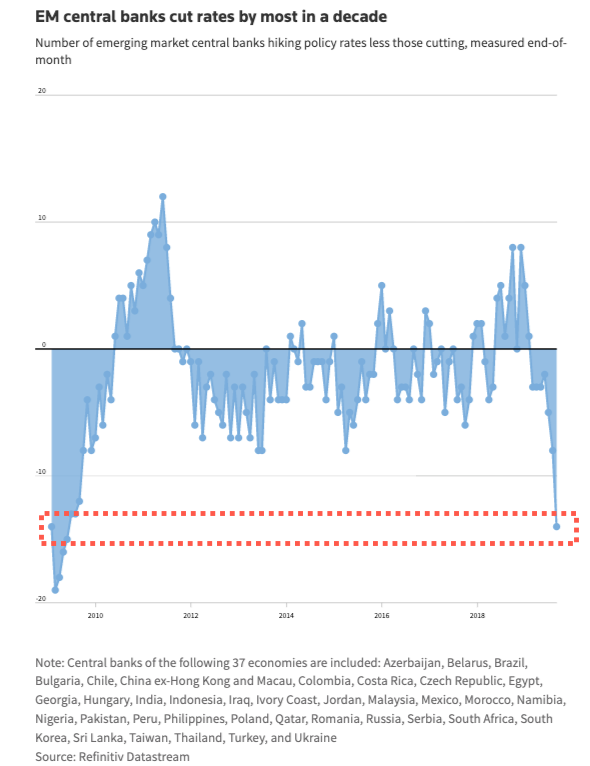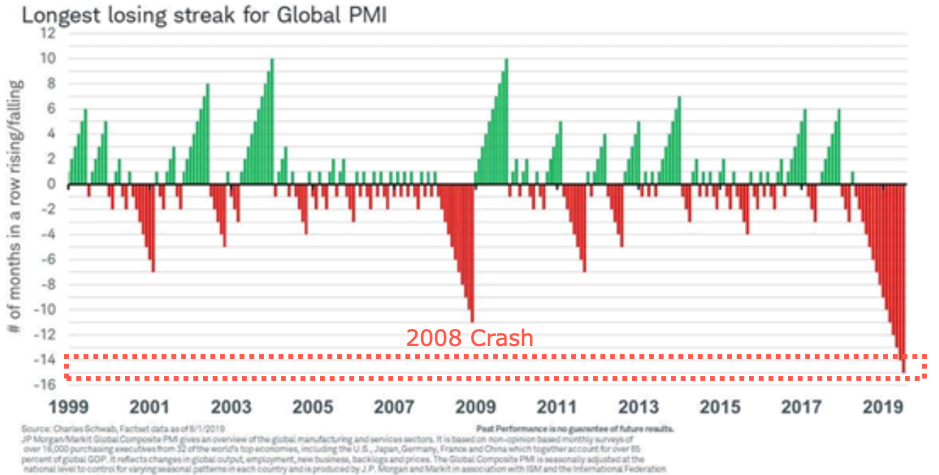Manufacturing across large parts of South America, Europe, Asia, and the Middle East are reeling from a global structural slowdown, amplified by the US and China trade war, have triggered emerging central banks to cut rates by the most in a decade, reported Reuters.

Emerging central banks took notice when major central banks including the US Federal Reserve and the European Central Bank started to cut interest rates this summer, all in an attempt to lessen the impact of a global synchronized slowdown.

Central banks across 37 emerging market economies recorded a net fourteen rate cuts in August, the most since policymakers dropped rates to zero after the global financial crash in 2008/09.
August marked the seventh straight month of net rate cuts followed by a tightening cycle that ended in early 2019. July recorded a net eight rate cuts. Cuts by Mexico and Thailand in August took markets by surprise.
After nine straight months of rate hikes in 2018, emerging central banks battled the fallout from a firm dollar, increasing inflation, and weaker local currencies.
Here's a complete list of the recent emerging market central bank policy decessions:
PARAGUAY - The central bank cut its policy rate by 25 basis points to 4.25% on Aug. 21.
INDONESIA - The central bank, hoping it can spur faster growth at home despite a global slowdown, surprisingly cut its key interest rate for a second time in two months on Aug. 22.
MEXICO - Policymakers cut on Aug. 15 the key lending rate by 25 basis points to 8.00%- the first reduction since June 2014, citing slowing inflation and increasing slack in the economy, and fuelling expectations that further monetary policy easing could be on the way.
EGYPT - Egypt's central bank cut the overnight deposit rate by 150 basis points to 14.25% on Aug. 22, its first cut since February, after July inflation figures came in significantly below expectations
MOZAMBIQUE - The central bank cut its benchmark interest rate by 50 basis points on Aug. 14 to 12.75%.
JAMAICA - Jamaica's central bank cut its interest rate by 25 basis points to 0.50% on Aug. 28.
NAMIBIA - Policymakers reduced the lending rate by 25 basis points to 6.5% on Aug. 14.
MAURITIUS - The central bank on Aug. 9 cut the repo rate by 0.15 basis points to 3.35%.
PERU - The central bank cut the benchmark interest rate to 2.5% on Aug. 9 amid growing expectations for an economic slowdown in the world's No.2 copper producer, but stressed its decision did not necessarily mean the start of an easing cycle.
SERBIA - The Serbian central bank surprised markets by cutting its benchmark interest rate another 25 basis points to 2.5% on Aug. 8, the second cut in as many months, to further bolster lending and growth.
THE PHILIPPINES - The central bank cut its benchmark interest rate on Aug. 8 and kept the door open for further easing to buttress the economy after growth slipped to its weakest in 17 quarters, hurt by tepid government spending and private sector investment.
BOTSWANA - The central bank cut the lending rate by 25 basis points to 4.75% on Aug. 29.
INDIA - The Reserve Bank of India (RBI) lowered its benchmark interest rates for a fourth straight meeting on Aug. 7 with a slightly bigger than expected cut, underscoring its worries about India's near-five year low pace of economic growth.
BELARUS - The central bank said on Aug. 7 it was cutting its main interest rate to 9.5% from 10% with effect from Aug. 14 and that the intensity of inflationary processes had slowed in the second quarter.
THAILAND - Policymakers unexpectedly cut the benchmark rate on Aug. 7, expressing worry about strength of the baht and aiming to help support faltering growth.
JORDAN - The central bank of Jordan reduced its main rate in early August by 25 basis points to 4.5%.
HONG KONG - The Hong Kong Monetary Authority (HKMA) cut its base rate charged through the overnight discount window by 25 basis points to 2.5% on Aug. 1, its first cut since late 2008, in line with the U.S. Federal Reserve's move. Hong Kong's monetary policy moves in lock-step with the Fed as its dollar is pegged at a tight range of 7.75-7.85 per dollar.
MOLDOVA - The central bank raised its main interest rate to 7.5% from 7% on July 31 to fight rising inflation caused by wage increases and higher food prices.
SAUDI ARABIA / BAHRAIN / UNITED ARAB EMIRATES - Central banks of Saudi Arabia, Bahrain and the United Arab Emirates - whose currencies are all pegged to the U.S. dollar - cut key interest rates to preserve monetary stability on July 31 after the Federal Reserve lowered U.S. interest rates for the first time in over a decade.
BRAZIL - In its first rate cut since March 2018, the central bank cut its benchmark interest rate to a new low of 6.00% on July 31, an aggressive first move in a widely anticipated easing cycle to inject life into a moribund economy and prevent inflation from slipping too far below target.
AZERBAIJAN - The central bank said on July 26 it had cut its refinancing rate to 8.25% from 8.50%.
RUSSIA - Policymakers cut the key interest rate on July 26 and flagged that one or two more cuts were possible later this year as Russia faces sluggish economic growth and slowing inflation.
TURKEY - The central bank slashed its key interest rate by a bigger-than-expected 425 basis points to 19.75% on July 25 to spur a recession-hit economy, its first step away from the emergency stance adopted during last year's currency crisis.
SOUTH AFRICA - The central bank cut its main lending rate as expected on July 18, but struck a cautious tone that suggested future cuts in borrowing costs were not a foregone conclusion despite benign inflation.
UKRAINE - Policymakers cut the main interest rate by half a percentage point to 17% on July 18, citing a downward inflation trend which is expected to continue in coming months and could pave the way for further monetary easing.
SOUTH KOREA - The central bank delivered a surprise interest rate cut on July 18, and shaved this year's growth forecast to the lowest in a decade, as a brewing dispute with Japan piled more pressure on the trade-dependent economy.
PAKISTAN - Policymakers hiked the main interest rate by 100 basis points on July 16 to 13.25%, citing increased inflationary pressures and a likely near-term rise in prices from higher utility costs.
DOMINICAN REPUBLIC - Policymakers cut interest rates by 50 basis points to 5% on June 30.
COSTA RICA - The central bank cut the key policy rate to 4.50% from 4.75% from June 20.
CHILE - Chile's central bank unexpectedly cut the benchmark interest rate by 50 basis points to 2.5% on June 7 as it braced for a sharper economic slowdown because of the U.S.-China trade dispute.
SRI LANKA - The central bank cut its key interest rates by 50 basis points on May 31, as widely expected, to support its faltering economy as overall business and consumer confidence slumped following deadly bomb attacks.
TAJIKISTAN - The central bank reduced the refinancing rate to 13.25% from 14.75% on May 31.
KYRGYZSTAN - Policymakers in the Central Asian nation cut the benchmark rate to 4.25% from 4.50% on May 28, citing slowing inflation.
ANGOLA - Angola's central bank cut its benchmark lending rate by 25 basis points to 15.5% on May 24.
ZAMBIA - The central bank in Lusaka raised the benchmark lending rate to 10.25% from 9.75% on May 22 to counter inflationary pressure and support macroeconomic stability.
MALAYSIA - The central bank on May 7 became the first in Southeast Asia to cut its key interest rate this year, by 25 basis points to 3.0%, moving to support its economy at a time of concern about global growth.
RWANDA - Rwanda's central bank cut its key repo rate by 50 basis points on May 6 to 5.0%.
MALAWI - Malawi's central bank cut its benchmark lending rate by 100 basis points on May 3 to 3.5%.
CZECH REPUBLIC - The Czech National Bank raised interest rates on May 2, using a window of opportunity created by easing economic risks abroad to stem rising domestic inflation by fine-tuning a tightening cycle it had paused at the end of 2018.
KAZAKHSTAN - Policymakers cut the policy rate by 25 basis points to 9.00% on April 15 in an expected move taken after President Kassym-Jomart Tokayev ordered them to make credit more affordable.
NIGERIA - In a surprise move, the central bank cut its benchmark interest rate to 13.5% from 14% on March 26 as part of an attempt to stimulate growth in Africa's biggest economy and signal a "new direction".
GEORGIA - The central bank cut its refinancing rate to 6.5% from 6.75% on March 13, citing forecasts suggesting that annual inflation would stay close to its 3% target this year.
TUNISIA - Policymakers in Tunisia raised the key interest rate to 7.75% from 6.75% on Feb. 19 to combat high inflation - the third such hike in the past 12 months.
The reason emerging market central banks were delivering the most cuts in a decade last month is that the world is likely in a trade recession that could significantly worsen into 1H20.
Many emerging market countries have export-driven economies to the developed world, and when demand slows down, their economies suffer the most.
Rate cuts from August will take at least one year to filter into emerging markets, which means economic data from the 37 regions will likely stay depressed for some time.
Commenti
Posta un commento